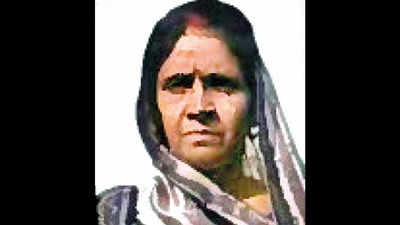- News
- City News
- lucknow News
- Class 5 passout in the fray to represent graduates’ seat in UP Legislative Council
Trending
This story is from November 20, 2020
Class 5 passout in the fray to represent graduates’ seat in UP Legislative Council
A class five passout woman is among the 24 candidates in the fray for election from Lucknow division for graduates constituency. The division comprises seven districts — Lucknow, Barabanki, Pratapgarh, Rae Bareli, Lakhimpur Kheri, Sitapur and Hardoi.

Kranti Singh
LUCKNOW: A class five passout woman is among the 24 candidates in the fray for election from Lucknow division for graduates constituency. The division comprises seven districts — Lucknow, Barabanki, Pratapgarh, Rae Bareli, Lakhimpur Kheri, Sitapur and Hardoi.
Among the candidates are four women, including Kranti Singh, a class five passout hailing from Sultanpur.The eldest candidate is 73-year-old Baba Hardeo Singh, a former civil servant. Six candidates are being backed by political parties.
Kranti Singh is a farmer with family assets worth Rs 35 lakh. TOI contacted Kranti Singh to enquire about the purpose for contesting the election to represent graduates, but she refused comment citing busy election campaign schedule.
TOI spoke to some constitutional experts to gather their views on a class V passout candidate entering the electoral fray to represent graduates.
Prof Chandra Prakash Singh, head of LU law department, said, “Ideally to represent graduates, a candidate, too, should be educated enough, otherwise how he/she would become their voice in the House.”
Prof Balraj Chauhan, constitutional expert and vice-chancellor of Dharmashastra National Law University, Jabalpur, said we need to appreciate the constitutional provision that even a person who is not formally educated but has sufficient competence, capability and intellectual integrity can contest polls. “The responsibility has been given to the electorate to choose their representative in the form of electoral college. Anyone who is contesting election, will be elected democratically by the electorate who is a graduate. This is the beauty of democracy,” prof Chauhan added.
Reiterating the same view, Prof Iqbal Ali Khan of Aligarh Muslim University, said, “The Constitution only provides different types of electorate to choose their representatives and it is not necessary that the person elected should also belong to that class. The whole onus and accountability lies on the electorate to choose.”
“The idea underlying in Articles 171 and 173 of the Constitution may not be to make any reservation for this class but to give them the right to choose their representatives,” he added.
Among the candidates are four women, including Kranti Singh, a class five passout hailing from Sultanpur.The eldest candidate is 73-year-old Baba Hardeo Singh, a former civil servant. Six candidates are being backed by political parties.
Kranti Singh is a farmer with family assets worth Rs 35 lakh. TOI contacted Kranti Singh to enquire about the purpose for contesting the election to represent graduates, but she refused comment citing busy election campaign schedule.
TOI spoke to some constitutional experts to gather their views on a class V passout candidate entering the electoral fray to represent graduates.
“Even an unlettered person can contest elections since the Constitution has a provision for that,” additional chief electoral officer, Yogeshwar Ram Mishra, told TOI.
Prof Chandra Prakash Singh, head of LU law department, said, “Ideally to represent graduates, a candidate, too, should be educated enough, otherwise how he/she would become their voice in the House.”
Prof Balraj Chauhan, constitutional expert and vice-chancellor of Dharmashastra National Law University, Jabalpur, said we need to appreciate the constitutional provision that even a person who is not formally educated but has sufficient competence, capability and intellectual integrity can contest polls. “The responsibility has been given to the electorate to choose their representative in the form of electoral college. Anyone who is contesting election, will be elected democratically by the electorate who is a graduate. This is the beauty of democracy,” prof Chauhan added.
Reiterating the same view, Prof Iqbal Ali Khan of Aligarh Muslim University, said, “The Constitution only provides different types of electorate to choose their representatives and it is not necessary that the person elected should also belong to that class. The whole onus and accountability lies on the electorate to choose.”
“The idea underlying in Articles 171 and 173 of the Constitution may not be to make any reservation for this class but to give them the right to choose their representatives,” he added.
End of Article
FOLLOW US ON SOCIAL MEDIA











